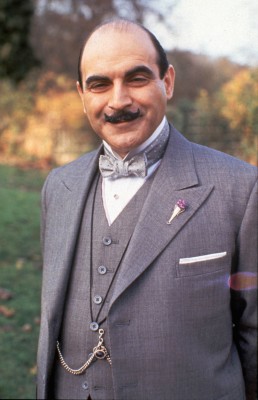| Reviews & Columns |
|
Reviews DVD TV on DVD Blu-ray 4K UHD International DVDs In Theaters Reviews by Studio Video Games Features Collector Series DVDs Easter Egg Database Interviews DVD Talk Radio Feature Articles Columns Anime Talk DVD Savant Horror DVDs The M.O.D. Squad Art House HD Talk Silent DVD
|
DVD Talk Forum |
|
|
| Resources |
|
DVD Price Search Customer Service #'s RCE Info Links |
|
Columns
|
|
|
Agatha Christie's Poirot: The Classic Collection - Set 3
Between A&E and Acorn Media, the long-running mystery series Poirot must surely rank among the most repackaged and reissued DVDs of all-time. Given the varied organizations of these boxed sets, it's to the point where interested parties wanting to collect the entire series are likely to find themselves hopelessly confused in the attempt. Back in a June 2007 review I attempted to untangle the labyrinthine jumble of releases, no easy task.
But the news isn't all bad, mon ami. Acorn Media's latest Poirot releases offer a less-expensive alternative to buying the one-hour run of the series three episodes at a time (as they were first released) or as Agatha Christie's Poirot - The Classic Collection, which offers all the one-hour shows at once but with a steep SRP: $199.99. This latest offering, also under the umbrella Agatha Christie's Poirot - The Classic Collection, divides everything into three-disc, nine-episode sets. The first three sets were released in early May, leaving one more set of nine episodes presumably to be come later this year, perhaps to coincide with the latest movie-length episodes. If that's the case, the total cost for the consumer will be about the same as the catch-all boxed set, but one at least can pace themselves, both in viewing the episodes and the hit on one's wallet.
In short, Agatha Christie's Poirot - The Classic Collection - Set 3 includes exactly the same discs that originally part of Acorn's single-disc Agatha Christie's Poirot - Collector's Set DVDs from 2002-2005. This three disc set includes what originally were sets 7, 8, and 9. The episodes are not exactly in their original airdate order. Included are:
"The Adventure of the Egyptian Tomb" (Episode #34 - original airdate: January 17, 1993)
The feature film-like lushness as Poirot went along is apparent in this Fifth Series show, a mystery similar to various film versions of The Mummy, about a seemingly cursed archeological dig. From Christie's short story collection Poirot Investigates (1924).
"The Underdog" (Episode #35- original airdate: January 24, 1993)
Rumpole of the Bailey's Mr. Bernard (Denis Lill) is the disagreeable murder victim (Poirot even calls him a philistine) in this story, which has an intriguing political undercurrent. The story first appeared in The Adventure of the Christmas Pudding and a Selection of Entrees, a 1960 short story collection.
"Yellow Iris" (Episode #36- original airdate: January 31, 1993)
Poirot gets a second crack at an unsolved murder in South America, where the great detective is actually arrested and roughed-up. Cracker's Geraldine Somerville guest stars. The story first appeared in The Regatta Mystery and Other Stories, published in 1939.
"The Case of the Missing Will" (Episode #37- original airdate: February 7, 1993)
Making excellent use of Cambridge University locations, this story has Poirot made executor to the will of a rich man who has been murdered before his wishes can be formalized. From Christie's short story collection Poirot Investigates (1924).
"The Adventure of the Italian Nobelman" (Episode #38- original airdate: February 14, 1993)
An Italian car and an Italian count prominently figure in this early story. From Christie's short story collection Poirot Investigates (1924).
"The Chocolate Box" (Episode #39- original airdate: February 21, 1993)
Like "Yellow Iris," this episode finds Poirot revisiting an old case, this one a long-unsolved murder of a French Deputy in Belgium. Available in Poirot's Early Cases (1974).
"Dead Man's Mirror" (Episode #40- original airdate: February 28, 1993)
An Art Deco mirror figures prominently here, in a story reportedly quite similar to another Christie/Poirot tale, "The Second Gong," from 1948. First published in Murder in the Mews and Other Stories, in 1937.
"Jewel Robbery at the Grand Metropolitan" (Episode #41- original airdate: March 7, 1993)
Poirot is on the trail of a priceless necklace while on holiday. From Poirot Investigates (1924).
And "The Adventure of the Clapham Cook " (Episode #1- original airdate: January 8, 1990)
A seemingly trivial case involving a missing cook ultimately proves much more gratifying than it first appears. Available in Poirot's Early Cases (1974).
Poirot the series in fact debuted with "The Adventure of the Clapham Cook" in January 1990, spurred by the popularity of the Hercule Poirot movies and other Christie feature film adaptations in the wake of Murder on the Orient Express (1975), the hugely successful film with Albert Finney as Poirot. By 1989 the movies had wound down but the Granada Television series generally known as The Adventures of Sherlock Holmes, which debuted in 1984, had been a big hit abroad, especially in America and in Japan. Poirot with its bigger budgets and less-troubled leading actor, proved similarly successful. Indeed, while the Holmes series struggled with ever-tightening budgets, Poirot only seemed to get even more lavish over time; as the series transitioned from one-hour episodes to feature-length productions, they began to look as sumptuous - maybe even more so - than the early Poirot movies of the 1970s.
Like The Adventures of Sherlock Holmes, Poirot's main draw, at least at first, was its fidelity to Christie, which had not at all been the case with the Miss Marple movies of the 1960s (modestly charming as they were) or the disastrous Tony Randall adaptation of The ABC Murders. Albert Finney and later Peter Ustinov both made very entertaining, contrasting Poirots, but neither was much like Christie's creation. David Suchet, on the other hand, was Christie's Poirot to a tee. A superb actor - many are surprised to hear him speak out-of-character, as in real-life he sounds nothing at all like his Poirot - Suchet is proud of his association with the series but also much too modest about his own accomplishments: "It's her character," he insists, "All I have done is lift him off her pages for you to see."
But Suchet's Poirot is a masterly portrayal of the fussy and vain Belgian, whose need for order and discipline borders on obsessive-compulsiveness, who is both amused and appalled by the lack of refinement of those around him. He is the perennial outsider looking in, who watches with quiet amusement and studiousness as his adopted countrymen watch him with bemusement and occasional casual prejudice. Related to this and one of the strong points of the series, is that through Poirot's observations, the series also examines the hypocrisy of the privileged classes, and makes wry retrospective observations about the tumultuous state of the world concurrent and always in the background of Poirot's cases (such as the rise of Nazism and the growing threat of World War). The hourly show was locked into a specific year - 1936 - but the later TV movies bounced around more freely through time.
Virtually overnight, Poirot the series became the definitive adaptation of the original stories, much as the Granada series had with Sherlock Holmes. Though the Holmes series was addled by star Jeremy Brett's illnesses and personal problems, there seems little doubt that, within the next few years, Suchet & Co. will have completed adapting all of Christie's Poirot stories, some 33 novels and 56 short stories in all.
The series did take some liberties, mainly in creating recurring appearances for some of the characters: Poirot's very kind-hearted but twittish friend, Captain Hastings (Hugh Fraser, whom the actor describes as "not the sharpest knife in the drawer"), his dedicated secretary, Miss Lemon (Pauline Moran), and Scotland Yard's Chief Inspector Japp (Philip Jackson), a kind of superior Inspector Lestrade. This despite the fact they appear infrequently in the short stories and novels. The later TV movies followed their original sources more strictly, and these supporting characters have generally disappeared from the later shows, to the disappointment of some viewers.
Video & Audio
Poirot was filmed in Super-16mm, quite common in British television of the time. Because of the limitations of the format and the manner in which they are 4:3 video mastered, the shows tend to look a bit greenish and muddy, but compensated to a large degree by the sheer lushness of the productions, which lean heavily on Streamline/Art Moderne architecture and fashions. Poirot would seem to be a prime candidate for the type of Blu-ray/high-def restoration recently given the miniseries Pride & Prejudice; until then, however, these shows look just fine. The Dolby Digital audio is fine, up to early-'90s television standards. There are no subtitles and Extra Features are limited to brief text pages about Suchet and other cast filmographies, and brief bio pages on Christie and Poirot himself.
Parting Thoughts
If you're a Poirot fan and already own these episodes, there's absolutely no need to buy these sets. But if you, like me, have held out until now, this may be the way to go. The shows can be purchased at a modest price when compared with the earliest releases, and viewers can enjoy them at a leisurely pace. Highly Recommended.
Film historian Stuart Galbraith IV's latest book, Japanese Cinema, is due in stores this June, and on sale now.
|
| Popular Reviews |
| Sponsored Links |
|
|
| Sponsored Links |
|
|
| Release List | Reviews | Shop | Newsletter | Forum | DVD Giveaways | Blu-Ray | Advertise |
|
Copyright 2024 DVDTalk.com All Rights Reserved. Legal Info, Privacy Policy, Terms of Use,
Manage Preferences,
Your Privacy Choices | |||||||














